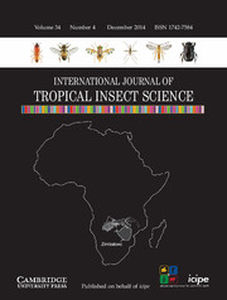Article contents
Field observations on the appearance of acridids and their natural enemies in The Gambia
Published online by Cambridge University Press: 19 September 2011
Abstract
A 1994 field survey of Sahelian grasshoppers and locust populations in natural vegetation, millet and rice fields in The Gambia determined the period between mid-August and early September to be the optimal time for applying oil-formulated conidia of the entomopathogenic fungus Metarhizium anisopliae var acridum to control the acridids. Locust and grasshopper cadavers were also examined for fungus infection. Metarhizium anisopliae was absent from cadavers of natural grasshopper populations, while the entomopathogenic fungus Entomophaga sp. was recovered on Hieroglyphus daganensis cadavers and the nematode Hexamermis sp. from Kraussaria angulifera, The predatory cattle egret fed on swarming adult desert locusts.
Résumé
Une enquête de terrain a été menée en 1994 en Gambie sur des populations sahéliennes de sauterelles et de criquets, en milieu naturel et dans les champs de mil et de riz. Elle a permis de déterminer que la période optimale pour l'application de la formule huileuse des conidies du champignon entomopathogène Metarhizium anisopliae var acridum, utilisée dans la lutte contre les acridiens, se situait de mi-août à début septembre. L'identité de l'infection fongique a été vérifiée sur des cadavres de criquets et de sauterelles. L'entomopathogène, Metarhizium anisopliae n'a pas été retrouvé sur les cadavres des populations naturelles de sauterelles. Par contre, on a trouvé un autre agent fongique entomopathogène Entomophaga sp. sur les cadavres de Hieroglyphus daganensis et, le nématode Hexamermis sp. sur Kraussaria angulifera. Enfin, nous avons constaté que le héron gardebœuf est responsable d'une prédation importante des criquets grégaires adultes.
Keywords
- Type
- Research Articles
- Information
- International Journal of Tropical Insect Science , Volume 21 , Issue 3 , September 2001 , pp. 219 - 223
- Copyright
- Copyright © ICIPE 2001
References
- 3
- Cited by


